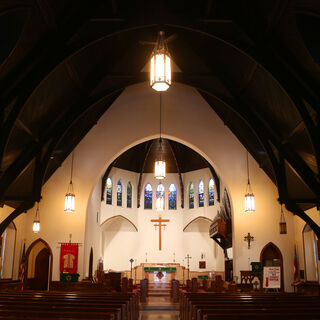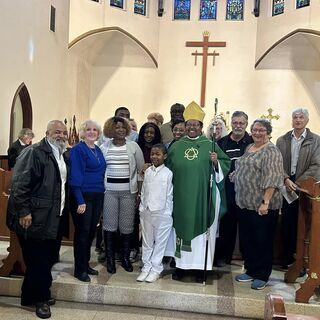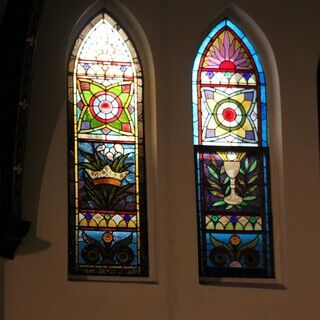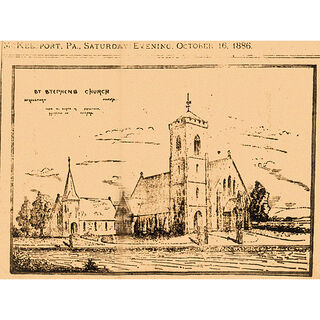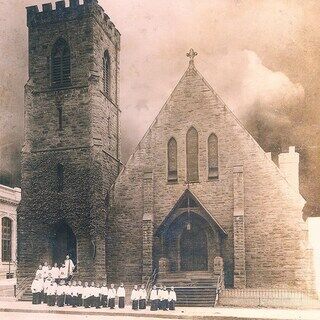We found 23 more Episcopal churches near McKeesport
 All Souls' Episcopal Church , North Versailles (4.12 miles)
All Souls' Episcopal Church , North Versailles (4.12 miles) St. Matthew's Episcopal Church, Homestead (4.64 miles)
St. Matthew's Episcopal Church, Homestead (4.64 miles) Good Shepherd Church , Pittsburgh (5.36 miles)
Good Shepherd Church , Pittsburgh (5.36 miles)
 St. Peter's Episcopal Church, Pittsburgh (6.24 miles)
St. Peter's Episcopal Church, Pittsburgh (6.24 miles) St. Stephen's Episcopal Church, Wilkinsburg (6.63 miles)
St. Stephen's Episcopal Church, Wilkinsburg (6.63 miles) Church of the Redeemer, Pittsburgh (6.96 miles)
Church of the Redeemer, Pittsburgh (6.96 miles) Church of the Holy Cross, Pittsburgh (7.5 miles)
Church of the Holy Cross, Pittsburgh (7.5 miles) Calvary Episcopal Church, East Liberty (8.09 miles)
Calvary Episcopal Church, East Liberty (8.09 miles) St. James' Episcopal Church, Penn Hills (8.21 miles)
St. James' Episcopal Church, Penn Hills (8.21 miles) St. Andrew's Episcopal Church, Highland Park (9.25 miles)
St. Andrew's Episcopal Church, Highland Park (9.25 miles) Trinity Cathedral, Pittsburgh (9.58 miles)
Trinity Cathedral, Pittsburgh (9.58 miles) St. Paul's Episcopal Church, Mt. Lebanon (9.88 miles)
St. Paul's Episcopal Church, Mt. Lebanon (9.88 miles) St. Paul's Episcopal Church, Monongahela (10.61 miles)
St. Paul's Episcopal Church, Monongahela (10.61 miles) Emmanuel Episcopal Church, Pittsburgh (10.89 miles)
Emmanuel Episcopal Church, Pittsburgh (10.89 miles) St. John's Episcopal Church, Donora (11.42 miles)
St. John's Episcopal Church, Donora (11.42 miles) St. David's Episcopal Church, Venetia (11.7 miles)
St. David's Episcopal Church, Venetia (11.7 miles) St. Thomas' Memorial Episcopal Church, Oakmont (11.77 miles)
St. Thomas' Memorial Episcopal Church, Oakmont (11.77 miles) Old St. Luke's Episcopal Church, Carnegie (12.13 miles)
Old St. Luke's Episcopal Church, Carnegie (12.13 miles) Church of the Atonement, Carnegie (12.17 miles)
Church of the Atonement, Carnegie (12.17 miles) Church of the Nativity, Crafton (12.21 miles)
Church of the Nativity, Crafton (12.21 miles) All Saints' Episcopal Church, Brighton Heights (12.88 miles)
All Saints' Episcopal Church, Brighton Heights (12.88 miles) Church of the Advent, Jeannette (13.27 miles)
Church of the Advent, Jeannette (13.27 miles) All Saints' Episcopal Church, Bridgeville (13.78 miles)
All Saints' Episcopal Church, Bridgeville (13.78 miles)
Who we are
We are a central church in the City of McKeesport that is committed to making the Mon Valley greater for God than it was for steel (to paraphrase the late Rev. Sam Shoemaker).
We are a biblical community of young and old, white and black, poor and rich. However, we are all equal in the eyes of God as His family. We seek to love one another as Jesus loved us.
Also serving Dravosburg, Versailles, White Oak, Glassport, Liberty, Lincoln, Port Vue, Elizabeth Twp., North Huntingdon, Irwin, and the Mon-Yough area
“The friendly church in the heart of town”! A member of the Episcopal Diocese of Pittsburgh and the worldwide Anglican Communion Sunday worship 10 a.m.
Priest in Charge: The Rev. Dr. Moni McIntyre
Vestry: Karen Slobodian (senior warden), John Ochap (junior warden), Lani Temple (clerk), Ethel Balas, Buddy Newman, Jo Pratt, Ed Seddon
Vestry meets second Wednesday of each month at 7 p.m., unless otherwise advertised, and meetings are open to all members of St. Stephen’s, unless closed by the vestry.
Organist: Georgia Lebedda
We are a biblical community of young and old, white and black, poor and rich. However, we are all equal in the eyes of God as His family. We seek to love one another as Jesus loved us.
Also serving Dravosburg, Versailles, White Oak, Glassport, Liberty, Lincoln, Port Vue, Elizabeth Twp., North Huntingdon, Irwin, and the Mon-Yough area
“The friendly church in the heart of town”! A member of the Episcopal Diocese of Pittsburgh and the worldwide Anglican Communion Sunday worship 10 a.m.
Priest in Charge: The Rev. Dr. Moni McIntyre
Vestry: Karen Slobodian (senior warden), John Ochap (junior warden), Lani Temple (clerk), Ethel Balas, Buddy Newman, Jo Pratt, Ed Seddon
Vestry meets second Wednesday of each month at 7 p.m., unless otherwise advertised, and meetings are open to all members of St. Stephen’s, unless closed by the vestry.
Organist: Georgia Lebedda
St. Stephen's Episcopal Church Q&A
Question: Who are Anglicans? Who are Episcopalians?
Answer: Anglicans — also known in some places as Episcopalians — are Christians who practice their faith in the context of the 38 autonomous member churches, or provinces, of the Anglican Communion, which spans 164 countries worldwide with 77 million members. One of these provinces is the Episcopal Church in the United States of America, with 2.4 million members in 112 dioceses, or geographic regions. Anglicans and Episcopalians are persons of many ethnic and cultural heritages. Anglicans are known for welcoming diversity of opinion and inquiry.Clergy within the Episcopal Church and the wider Anglican Communion are men and women who are ordained as bishops (after being elected in local dioceses), priests and deacons. Clergy often have spouses while others are single.
Many church members, or laity, hold various leadership positions that range from election to local parish vestries (or boards of directors) or as deputies to General Convention, the Episcopal Church’s bicameral legislative structure.
Anglicans and Episcopalians practice a faith that is liturgically and theologically a bridge between Catholicism and Protestant traditions. Anglicans and Episcopalians value a balance of scripture, reason and tradition as set forth by 16th-century English theologian Richard Hooker.
Question: What is the Church of England, and how does it relate to the Episcopal Church?
Answer: Before the sixteenth-century Reformation in western Europe, the Christian church in a given country or region was customarily described as the church of the region, such as the Gallican Church, the Spanish Church, the English Church (Latin ecclesia anglicana), or the Church of England.After the Reformation, the English national church continued to be called the Church of England, but it repudiated the supremacy of the Pope. It retained, however, its ancient episcopal polity. By the 1534 Act of Supremacy, King Henry VIII became “Supreme Head of the Church of England,” and by the 1559 Act of Supremacy, Elizabeth I became “Supreme Governor of the Church of England,” supplanting the Pope.
To this day the Church of England is episcopal in polity, with the sovereign, who still bears the Elizabethan title, as its legal administrative head. The Church of England is divided into the Province of Canterbury and the Province of York. The Archbishop of York is the Primate of England and Metropolitan, and the Archbishop of Canterbury is the Primate of all England and Metropolitan. The Province of Canterbury consists of thirty-one dioceses and the Province of York consists of fourteen dioceses.
The Episcopal Church derives much of its doctrine, discipline, and worship from the Church of England.
Question: What is the Episcopal Church?
Answer: The Episcopal Church (TEC) is a province of the Anglican Communion.A conference of three clergy and 24 lay delegates met at Chestertown, Kent County, Maryland, on November 9, 1780, and resolved that “the Church formerly known in the Province as the Church of England should now be called the Protestant Episcopal Church.” On August 13, 1783, the Maryland clergy met at Annapolis and adopted the name “Protestant Episcopal Church.” At the second session of the 1789 General Convention, September 29-October 16, 1789, a Constitution of nine articles was adopted. The new church was called the “Protestant Episcopal Church in the United States of America” (PECUSA). The word “Protestant” noted that this was a church in the reformation tradition, and the word “Episcopal” noted a characteristic of catholicity, the historic episcopate.
The church has grown from 13 dioceses to more than 100 dioceses. It is divided into nine geographical provinces. It is governed by a bicameral General Convention, which meets every three years, and by an Executive Council during interim years. The General Convention consists of the House of Bishops and the House of Deputies. The House of Bishops is composed of every bishop with jurisdiction, every bishop coadjutor, every suffragan bishop, every retired bishop, every bishop elected to an office created by General Convention, and every bishop who has resigned because of missionary strategy. All members of the House of Bishops have seat and voice in the House of Bishops. The House of Deputies is composed of up to four lay and four clerical deputies from each of the dioceses. The two top leaders of the church are the Presiding Bishop, who is also called Primate and Chief Pastor, and the president of the House of Deputies.
The 1967 General Convention voted to add a preamble to the Constitution, which states, “The Protestant Episcopal Church in the United States of America, otherwise known as The Episcopal Church (which name is hereby recognized as also designating the Church)….” The title page of the 1979 BCP states that the Book of Common Prayer is “According to the use of The Episcopal Church.”
Church Address
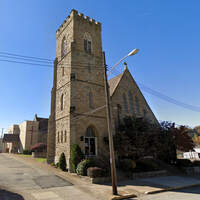
220 Eighth Ave
McKeesport,
PA
15132
United States
Phone: 412-664-9379
Fax: 412-664-1509
Download St. Stephen's Episcopal Church vCard with Service Times
Click here to contact the church
Church Pastor

Rev. Dr. Moni McIntyre
Pastor
220 Eighth Ave
McKeesport,
PA
15132
United States
Phone: 412-664-9379
Fax: 412-664-1509
Download Pastor Rev. Dr. Moni McIntyre vCard
Click here to contact Rev. Dr. Moni McIntyre
Denomination
Episcopal Church
Episcopal Churches in McKeesport, PA
Episcopal Churches in Pennsylvania
Episcopal Churches in United States
Episcopal Churcheses near me
All churches in McKeesport, PA

Affiliations
Church Website
St. Stephen's Episcopal Church on Social Media
YouTube Video: Second Sunday of Easter, St. Stephen's Episcopal Church
Facebook Video: Epiphany January 7, 2024
Leadership
Leader Name:
Rev. Dr. Moni McIntyre
Leader Position:
Pastor
Formal Title:
Leader Address:
Phone:
Fax:
412-664-1509
Leader Email:
Click here to contact Rev. Dr. Moni McIntyre
Leader Bio:
Rev. Dr. Moni McIntyre on Social Media:
Other Church Leaders:
Leadership Photos
Add a Photo
Administration
Admin Name:
Admin Position:
Admin Address:
Phone:
Fax:
Admin Email:
Mailing Address
Driving Directions
Travel/Direction Tips
Know how to get there? Share the knowledge with others!
Parking
Please share parking information and/or parking experience!
St. Stephen's Episcopal Church Service Times
Our main worship is on Sunday morning:
Eucharist Rite II: 10 a.m.
Traditional
Please join us for coffee and fellowship following the 10 a.m. service!
Other Events (subject to change without notice)
Elisha Ministries of McKeesport: 12 noon Sunday
Bible Study: 6:30 p.m. Tuesday
N.A.: 7 p.m. Monday, 10 a.m. Saturday
12/12 Program: 7 p.m. Wednesday
A.A.: 7:30 p.m. Thursday
It's been more than a year since the last service times update. Please make sure to contact the church to confirm service times.
Please contact the church to confirm Service Times or SUBSCRIBE to updates below
Eucharist Rite II: 10 a.m.
Traditional
Please join us for coffee and fellowship following the 10 a.m. service!
Other Events (subject to change without notice)
Elisha Ministries of McKeesport: 12 noon Sunday
Bible Study: 6:30 p.m. Tuesday
N.A.: 7 p.m. Monday, 10 a.m. Saturday
12/12 Program: 7 p.m. Wednesday
A.A.: 7:30 p.m. Thursday
It's been more than a year since the last service times update. Please make sure to contact the church to confirm service times.
Please contact the church to confirm Service Times or SUBSCRIBE to updates below
Worship Languages
Dress Code
Sunday School / Children and Youth Activities
Under 12s:
Under 18s:
Local outreach & community activities
Other activities & ministries
Special Needs/Accessibility
Prayers and Hymns
Main Bible:
Hymns and Songs:
Other information
Average Adult Congregation:
Average Youth Congregation:
Additional Info:
St. Stephen's Episcopal Church McKeesport Photos
St. Stephen's Episcopal Church History
The first Episcopal service in McKeesport was held in the “little red school house” in 1869. This building, McKeesport’s first school, was located on Market Street, Downtown. (The building is now located in Renziehausen Park and is part of the McKeesport Heritage Center.)
Services also took place in the homes of church members, the Masonic Hall, and at the German Lutheran and Presbyterian churches. The Rev. Dr. Killikelly also conducted services in Dravosburg as well, and opened a Sunday school in Port Vue near the old Penny coal mine.
In the meantime, future members of what would become St. Stephen’s purchased two lots near the corner of Eighth Avenue and Market Street, Downtown, for $1,590 for future erection of a suitable sanctuary.
The name St. Stephen’s was adopted in 1871, when a mission church was created for 33 confirmed members of the Episcopal Church.
The cornerstone for the church building was laid in 1872 and the wooden-frame church was constructed at a cost of $2,800. The first services in the new building were held in 1873.
Conditions in the fast-growing town of McKeesport were still primitive, and there were no bridges connecting the then-borough of McKeesport with the neighboring communities across the rivers. On Sundays, the church’s deacon-in-charge used a log raft to help parishioners who lived on the opposite banks of the Monongahela and Youghiogheny rivers to get to services!
St. Stephen’s was incorporated as an independent parish on Nov. 3, 1885. At about the same time, the old frame church building was moved to the rear of the parish’s property for use as a “guild hall,” and the cornerstone for a new stone church was laid in May of 1886. The cost of the new church—the first stone building in McKeesport—was $15,000.
In 1948, the old wooden guild hall was demolished and replaced with a new Parish House, annexed to the church. In the mid-1980s, the old McKeesport Post Office was purchased and demolished and is now used as a parking lot.
—history taken from A McKeesport Commemorative (McKeesport, Pa.: 1976), p. 117.
Services also took place in the homes of church members, the Masonic Hall, and at the German Lutheran and Presbyterian churches. The Rev. Dr. Killikelly also conducted services in Dravosburg as well, and opened a Sunday school in Port Vue near the old Penny coal mine.
In the meantime, future members of what would become St. Stephen’s purchased two lots near the corner of Eighth Avenue and Market Street, Downtown, for $1,590 for future erection of a suitable sanctuary.
The name St. Stephen’s was adopted in 1871, when a mission church was created for 33 confirmed members of the Episcopal Church.
The cornerstone for the church building was laid in 1872 and the wooden-frame church was constructed at a cost of $2,800. The first services in the new building were held in 1873.
Conditions in the fast-growing town of McKeesport were still primitive, and there were no bridges connecting the then-borough of McKeesport with the neighboring communities across the rivers. On Sundays, the church’s deacon-in-charge used a log raft to help parishioners who lived on the opposite banks of the Monongahela and Youghiogheny rivers to get to services!
In 1948, the old wooden guild hall was demolished and replaced with a new Parish House, annexed to the church. In the mid-1980s, the old McKeesport Post Office was purchased and demolished and is now used as a parking lot.
—history taken from A McKeesport Commemorative (McKeesport, Pa.: 1976), p. 117.
St. Stephen's Episcopal Church Historical Photos
 "Prayer is not so much an act as it is an attitude - an attitude of dependency, dependency upon God".
"Prayer is not so much an act as it is an attitude - an attitude of dependency, dependency upon God". Arthur W. Pink
St. Stephen's Episcopal Church listing was last updated on the 20th of January, 2024
THANK YOU FOR VISITING ST. STEPHEN'S EPISCOPAL CHURCH ONLINE!
St. Stephen's Episcopal Church Accelerated Mobile Page (AMP)


